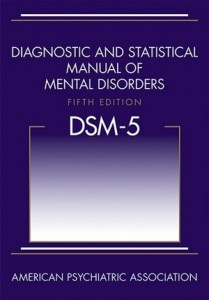 The use of the word “disorder” as a label for most mental health syndromes is, put simply, irresponsible and ill-conceived.
The use of the word “disorder” as a label for most mental health syndromes is, put simply, irresponsible and ill-conceived.
There are two serious problems with describing psychological syndromes as disorders. First, the concept of disorder is an inadequate and illogical description of what is happening. Second, it often has negative, sometimes disastrous, effects on self-image.
Finding Order in Chaos
The word disorder is defined as a confused or messy state: a lack of order or organization. Thus, if we take the Diagnostic and Statistical Manual of Mental Disorders (DSM-5) literally, anyone who meets the criteria for grief, depression, anxiety, posttraumatic stress, or hundreds of other syndromes is considered to be lacking psychological organization.
This couldn’t be further from the truth.
If you pay close attention to the psyche of most anyone experiencing a mental health issue, you’ll see that the symptoms they’re experiencing are not a disordered collection of random and meaningless responses. What you’ll find is the exact opposite. In my experience, nearly every psychological syndrome, other than ones which are largely organic in etiology, is an orderly, strategic, and purposeful response to suffering. In other words, mental health issues are not disordered; they are ordered and normal responses that exist for the purpose of preventing the individual from being hurt again.
Imagine a person—let’s call him Oliver—who’s been diagnosed with having a borderline personality by his mental health provider. Oliver tends to “split” people in a way that those with a “borderline” constellation often do. Splitting is the process of shifting between states of idealizing and devaluing others and oneself.
The part of Oliver which devalues, when activated, views others as “all bad.” So if Oliver’s girlfriend does something that triggers his vulnerability—say, by choosing to spend time with someone else or perhaps by criticizing him—Oliver’s devaluing part, in an effort to protect him from feeling rejected, worthless, and unlovable, psychologically hijacks him and manifests as hatred toward his girlfriend.
Oliver is so livid and hateful toward his girlfriend at times because, as many psychotherapists have noted, the power and intensity of a person’s protection is equal to the power and intensity of his or her vulnerability. The act of viewing his girlfriend as all bad, embodying rage, feeling contempt, and lashing out at the external trigger of the suffering helps Oliver to automatically and powerfully obliterate and shield from the feeling of worthlessness, which is the real source of his suffering—internalized worthlessness and shame that he took on as child as a result of verbal abuse, emotional neglect, and abandonment by caregivers, parents, or peers.
This part of Oliver which devalues and vilifies his girlfriend, as well as other people in his life who trigger him, has an important job to do: it’s trying to help him from feeling the old feelings he felt in childhood. If Oliver were to fail to vilify and blame others who trigger him, he would likely feel overwhelmed with the same old worthlessness. This is why people with this sort of internal constellation have a reputation for self-harm and suicide; they’re not always successful at keeping the overwhelming feelings of shame, worthlessness, and hopelessness out of their awareness.
The protective ego state that forms the other end of the splitting polarization is a part of Oliver which idealizes his girlfriend, as well as other people in his life, and views them as “all good.” This part helps the parts of him which harbor the shame and worthlessness to have hope for redemption, hope of finally being loved. By idealizing, worshiping, and viewing his girlfriend as the manifestation of perfection, Oliver’s parts which carry the worthlessness can have hope that someone exists who will love and care for them in a way they’ve always needed—essentially redeeming the young parts which have felt so rejected and worthless. Oliver is essentially borrowing love from his girlfriend, using his association with her to avoid feeling unloved. Of course, many of us do this, not just those with borderline systems.
I’ve used one symptom of the “borderline” constellation, splitting, to demonstrate that there is an organized and orderly response to suffering and that the term disorder is inadequate. The same goes for nearly any other emotionally based syndrome.
Depression, for example, in its protective form prevents an individual from feeling the pain of failure, which can include many related feelings. It does this by shutting a person down and keeping one from trying again. In depression’s vulnerable form, it overwhelms a person with sadness and feelings of worthlessness. In psychodynamic talk, the person is consumed by the pain. Likewise, anxiety, addictions, anger, self-criticism, guilt, grief, and many other issues all serve a function and have their own organized and orderly logic. The point I hope I’m making is that the term disorder, when used to describe the majority of mental health issues, is inadequate because it fails to capture the positive intention behind most forms of protection, regardless of how destructive they may be.
People Are Not Fundamentally Flawed
It would be easy to dislike Oliver. Imagine being his girlfriend. One day she’s practically worshiped by Oliver, probably redeeming her own needs to be seen and loved; the next day she’s hated and vilified.
Many of us can relate to Oliver’s girlfriend. We all have people in our lives who can trigger us and, if we let them, get on our nerves. The trigger doesn’t always come in the form of contempt, like what Oliver dishes out—it comes from anything that’s destructive and hurtful or from anything with the potential to activate vulnerability within us, such as anxiety, self-doubt, criticism, depression, sadness, grief, addictive behavior, and so on. Some of these protective strategies cause harm to self and others, and some just bother us because they threaten to awaken our own vulnerability. That’s why we don’t like them. And it’s no wonder that as a result, the tendency exists, both within and outside mental health circles, to view others as the problem and as fundamentally flawed.
Most people don’t take the time to be curious about someone who’s being destructive or self-destructive; we just want them to change. So, really, what often happens is a judgment is made that the person is “crazy,” “effed up,” or, of course, disordered. Additionally, many in our culture are influenced by the idea of original sin, believing that we don’t come into the world whole, and many in certain circles believe that bad things happen only to bad people.
Seeing past this kind of thinking requires a gigantic paradigm shift. This paradigm shift has been encouraged by many innovators within the field of mental health, especially visionaries from the humanistic, psychodynamic, and depth traditions. The shift consists of two ideas that form the basic tenets of the Internal Family Systems approach to psychotherapy, one of the fastest-growing contemporary models of psychotherapy. They are as follows:
- Everyone is doing the best they can to survive based on their experiences and their physiology.
- Every part of a person (defense mechanism, issue, ego state, or aspect) has some positive intention, even when it’s destructive to self or others, whether it’s depression, addiction, anxiety, anger, self-criticism, or anything else.
Because all of our parts are doing the best they can to help us survive, they are fundamentally good, not fundamentally flawed. Even if what they do can cause damage. When we see that goodness, that positive intention, it’s easier to have compassion for a part.
Other than a small percentage of people born without the requisite hardware, all of us come into the world fully equipped to experience empathy, remorse, compassion, and other positive qualities. If the caregivers and peers of our youth can nurture us adequately, we flourish; we experience joy, satisfaction, and connection to others. But because there is suffering and danger in life, because things happen to us and around us which burden us with extreme feelings and beliefs, few of us mature into adulthood without some wound and/or protection. Nearly all of us, to some degree, are among the walking wounded. Wounded, though, is far different than fatally flawed.
Depending on a number of factors, including temperament, personality, and how exactly a person has suffered, everyone develops, most often unconsciously, particular and specific strategies to survive, to cope, to self-soothe, to numb pain, to escape, and to never be hurt again. Those who have experienced significant and/or frequent trauma have to work harder psychologically than those fortunate enough to have not suffered as much. Regardless of the kind of strategy, be it addiction, self-criticism, guilt, grief, anger, depression, anxiety, avoidance, or something else, it is just a survival strategy, not who the person is. Were it safe for these protective strategies to relax, the true Self, the indelible core that lies unharmed behind all of our defenses and wounds, would shine through.
Infuriated by the idea presented above—that all parts are good, that all people are good at their core—many people assume that I’m letting perpetrators off the hook and declare that there is no positive intention in the act of, say, sexual abuse. I’m not justifying, excusing, or condoning the behavior of perpetrators and predators. I’m simply stating that these individuals (when not simply lacking the capacity for empathy and remorse, as is the case in sociopathy) are deeply wounded, often from the same sort of abuse they desire to act out on others, and have protective parts trying, in the only way they know how, to actualize a positive intention.
Let me explain by way of example. Years ago I provided therapy to a man who had been sexually abused by his father. The experience was terribly confusing and painful for him. He felt tainted by what he described as a “darkness of shame and damaged goods” in his body that, when felt, made him want to throw up. Although what his father did violated his body, violated the trust that should exist between a father and a son, and violated the commitment a father should have to cause no harm to his children, the act was, sadly, one of the few ways this person ever felt loved by his father. As a result, he wrestled with urges to act out the same abuse on others so that he could experience the love and affection that had become associated with the abuse he endured.
This conditioning is a powerful and often overlooked part of the compulsion to carry out sexual abuse. The majority of perpetrators, in addition to being stopped from abusing and hurting others, benefit from therapy and compassion. Of course, if you or someone close to you has been sexually abused, you may have a difficult time accepting this compassionate approach. I encourage you to look at your anger and judgment as an indication that there might still be pain to heal.
Why the Term and Concept of ‘Disorder’ Is Harmful
Labeling a person who presents with symptoms resulting largely from life experience as disordered is not only ill-conceived and inadequate, it can be harmful to the person’s self-concept, spirit, and his or her access to hope. Why should one try to heal themselves, reclaim their Self, face their worst fears and the skeletons in the closet if they’re disordered and destined as flawed?
Receiving a professional diagnosis can be an enormous relief and provide new hope to those who have not understood their symptoms, especially long-standing ones. But being viewed and labeled as disordered is much different than receiving a diagnosis. Even mentioning or including a reference to the concept of disorder as part of a clinician explaining a new diagnosis significantly changes what is communicated.
The term and concept of “disorder” is particularly harmful in the context of “personality disorder.” By labeling an individual as personality disordered or, in its more gentle form, stating that one has a personality disorder, the essential claim being made is that one’s personality, one’s person-hood, one’s essence, is fundamentally flawed. Such a diagnosis is very likely to add shame, worthlessness, and hopelessness to a person who has had enough. It doesn’t matter how such a label is framed, normalized, or expressed; having a diagnosis called “personality disorder” says one thing: you are fundamentally flawed.
Please don’t misunderstand me: I’m not claiming that people don’t fit the criteria for the DSM categories of borderline, narcissism, and other personality constellations. Rather, I’m concerned about the impact of using a label that communicates to those with certain personality constellations that they are fundamentally flawed. Indeed, those who fit the criteria for the personality constellations listed in the DSM are usually deeply wounded and powerfully protected. But are they fundamentally and irreparably flawed?
No.
A person labeled as borderline, for example, does not start out with such a polarized and fragile inner system; he or she was born as a loving and lovable child, fully equipped to develop healthy self-esteem, confidence, self-soothing, and other positive qualities. But significant things happened (abuse, trauma, neglect) or did not happen (attachment, connection, love, soothing), resulting in extreme feelings and beliefs that cover over and hinder access to the qualities of calm, self-compassion, self-esteem, confidence, etc.
Even more harmful than using the term disorder or personality disorder in diagnostics are those therapists who view people through the lens of pathology. Often implicit, sometimes quite explicit, the telltale sign is a therapist viewing the person’s symptoms as negative features to be eliminated, amputated, overcome, disposed of, or medicated away rather than as important messages from the psyche about what is needed for deeper and lasting change.
For many years, this pathological lens was the standard method of viewing and treating those labeled with personality disorders. Years ago, when I worked in community mental health, I was horrified to witness the level of disdain and judgment passed on people who fit the diagnostic criteria for personality disorders. Now I understand how those clinicians who reacted with contempt and irritation were feeling scared, confused, helpless, unsure, or vulnerable, consciously or unconsciously. Unable to identify and take ownership of their vulnerability, they lashed out and numbed themselves by pathologizing people who came to them for therapy.
If you’ve worked long enough helping people to grow and heal, you see that people do indeed bring temperaments and tendencies into the world, but you also see that emotional wounds are generally not something one is born with. Most often they are received as a part of life experience and, of course, many people are physiologically predisposed to certain protective functions which activate as a result of an environmental trigger or experience. Whatever the case, through witnessing people heal and transform long-standing, integral wounds, you realize that most symptoms are not destined to permanency.
With sufficient time, attention, and care, anyone is capable of healing. Emotional and psychological transformation may not happen in this lifetime, but pathology-focused treatments and pathology-focused therapists should not present an additional barrier to change. It’s simply not in the best interest of the individual, the community, or the future of humankind to focus on judging, exiling, or amputating human qualities we misunderstand or fear.
If, like me, you believe that the term disorder is ill-conceived, inadequate, and harmful as it is used in psychotherapy to describe emotionally based issues, please help generate support by sharing this article. Twenty years from now, when the DSM-6 is published, my hope is that the term disorder will be entirely absent other than in reference to the dark ages of pathology-focused treatment.

The preceding article was solely written by the author named above. Any views and opinions expressed are not necessarily shared by GoodTherapy.org. Questions or concerns about the preceding article can be directed to the author or posted as a comment below.

 Myth Madness: 'The Therapist Will Interrogate, Blame, and Shame Me'
Myth Madness: 'The Therapist Will Interrogate, Blame, and Shame Me' Myth Madness: 'Therapy Is Endless and Will Cost a Fortune'
Myth Madness: 'Therapy Is Endless and Will Cost a Fortune' Myth Madness: 'The Therapist Has It All Worked Out'
Myth Madness: 'The Therapist Has It All Worked Out'

